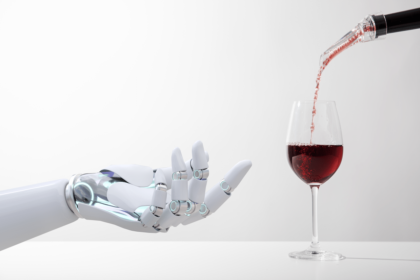
Artificial intelligence (AI) is rapidly transforming many industries, and the wine industry is no exception. AI-powered tools and technologies have the potential to revolutionize the way wine is produced, marketed, and enjoyed. Here are some of the ways that AI could help improve wine:
Vineyard Management
AI can be used to analyze data from vineyards, such as soil composition, weather patterns, and grape yields, to help winemakers make better decisions about how to grow their grapes. AI-powered systems can be used to identify areas of the vineyard that need more or less water, or to predict when diseases are likely to occur. This can help winemakers to produce higher quality grapes with less waste. Ceres Imaging for example, can map fields of their clients using fixed-wing aircraft that captured color, thermal, and infrared images of the vineyard. This data is then analyzed by AI to determine if the wine producer is watering too much or not enough some its grapes. By using this technology, the winery improves water management and vine health.
Winemaking
AI can also be used to improve the winemaking process itself. AI-powered systems can be used to analyze the chemical composition of grape juice and wine to help make adjustments to the fermentation and aging processes. AI can also be used to predict how wines will develop over time, which can help winemakers to make better decisions about when to release their wines.
Wine Marketing and Sales
AI can also be used to improve the way that wine is marketed and sold. AI-powered systems can be used to analyze consumer data to identify trends and preferences. This information can then be used to create more targeted and effective marketing campaigns. AI can also be used to develop personalized wine recommendations for consumers.
Wine Education
AI can also be used to improve wine education. For example, AI-powered chatbots can answer consumers’ questions about wine in a personalized and informative way. AI can also be used to develop interactive wine tasting experiences helping consumers to learn more about different wines.
Here are some specific examples of how AI is being used to improve wine today:
- Vineyard Robotics: Some companies are developing AI-powered robots that can perform tasks such as pruning vines, weeding, and harvesting grapes. This could help winemakers to reduce costs and improve efficiency.
- AI-Powered Winemaking Tools: Some companies are developing AI-powered tools that can help winemakers to manage the fermentation and aging processes more effectively. One company has developed an AI-powered system that can monitor the chemical composition of wine during fermentation and make adjustments to the temperature and yeast levels to ensure optimal fermentation conditions.
- AI-Powered Wine Recommendation Engines: Some companies like Tastry, a California-based startup, are developing AI-powered wine recommendation engines that can help consumers to find wines that they will enjoy. Tastry’s AI technology learns aroma and flavor profiles by analyzing wines in their lab. When they combine this data with consumer palate data from quizzes, Tastry can predict consumer product scores with over 92% accuracy. These engines typically take into account factors such as the consumer’s past wine purchases, taste preferences, and budget.
- AI-Powered Wine Tasting Apps: Some companies are developing AI-powered wine tasting apps that can help consumers to learn more about different types of wine. These apps typically use image recognition and machine learning to identify the different flavors and aromas in a wine.
Conclusion
AI has the potential to revolutionize the wine industry in many ways. AI-powered tools and technologies can help winemakers to grow better grapes, produce higher quality wine, and market and sell their wines more effectively. AI can also be used to improve wine education and help consumers to learn more about wine and find wines that they will enjoy.
As AI technology continues to develop, we can expect to see even more innovative and groundbreaking ways to use AI to improve wine. For example, AI could be used to develop new grape varieties that are more resistant to pests and diseases, or to create personalized wine blends that are tailored to the individual consumer’s taste preferences.
Overall, AI has the potential to make wine more enjoyable and accessible for everyone.



